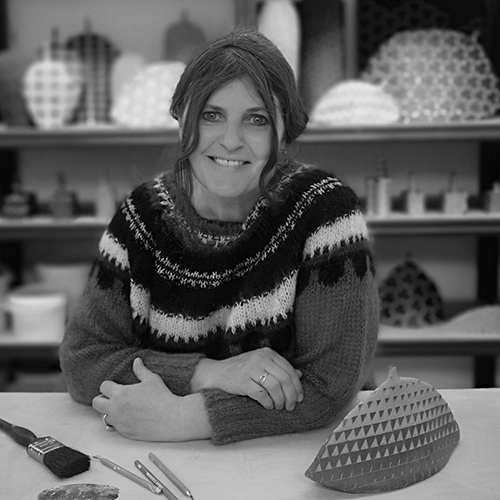

Björk’s professional background is in architecture and her work remains unequivocally architectural to her eyes and is influenced by her training and profession in many ways. However, natural forms reflecting her upbringing in Iceland and exposure to the extraordinary in nature are also reference points.
She sees her work as a conversation between the pseudo-perfection of geometric pattern and the tactile impurity of hand-manipulated clay. She often deliberately produces warped planes through the careful pattern cutting and joining of would-be flat slabs so that vessels become intentionally and subtly off-kilter.
Form and pattern are individually and equally important, but her work is defined by the interaction of these very distinct attributes. She creates an ambiguity in the pieces caused by placing a rigid, geometric pattern onto an organic form, and vice versa. The ‘grain’ of the pattern vastly alters the perception of a piece, and two superficially similar forms will appear unrelated when rendered with different patterns.
Björk is drawn to monochrome. This could be seen as a reflection of the monochromatic palette of the Icelandic landscape, particularly in winter. She sometimes thinks her work is reflective of that landscape with black lava peeking out from beneath snow covered planes. However, that is an entirely subconscious outcome. Her decorative process simply suits monochrome, and the limited palette seems to strike the right balance between form and pattern. The basic premise of a ‘draped’ pattern over architectural form is straightforward but the range of expression it allows is vast.

PRODUCT CODE:BH569Y12

PRODUCT CODE:BH569Y14

PRODUCT CODE:BH569Y11

PRODUCT CODE:BH569Y15

PRODUCT CODE:BH569Y13

PRODUCT CODE:BH569Y10